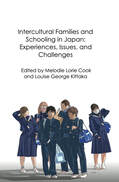Intercultural Families and Schooling in Japan: Experiences, Issues, and Challenges
Edited by Melodie Lorie Cook and Louise George Kittaka
(Life and Education in Japan Series) [Download reading sample] [ Kindle | ePub | Print | Scribd | Apple | Perlego | Proquest ]

The purpose of this book is to show how research on families can be used to offer inspiration, suggestions, and guidance to intercultural families choosing to school their children in the regular Japanese school system. Each chapter is written by a parent or parents who are themselves researchers and thus bring their skills to the task of writing about issues which have affected their families, and are likely to affect other families in similar ways. There are also suggestions for other non-Japanese parents coping with similar issues.
The book is divided into three sections: The first, “Finding our own way”, deals with children’s and parents’ struggles with identity and inclusion in Japanese schools and society. The second, “Dealing with the Japanese school system”, offers narratives and advice on such topics as coping with homework and dealing with more than one school system, as well as what government-accredited Japanese overseas schools have to offer. The third section, “Coping with challenges”, examines the experiences of families where children are “different” because they have physical or intellectual challenges, or live with foster or adoptive families. The book concludes with a narrative about a family who made the decision to remove their children from the Japanese system entirely and send them abroad for schooling.
The authors of the chapters in this book are all current or former university faculty, living in different areas of Japan. Some, who live in highly-populated urban areas, have had ample opportunities to locate educational options for their children, while others, living in rural communities, have had to struggle to advocate for their children’s inclusion in mainstream classes. Their stories are all compelling and their advice is certain to be helpful to those planning to or already raising children in Japan. This book will also be of value to researchers and educators, particularly those with an interest in bilingualism, intercultural families, and cross-cultural issues, along with anyone wishing to learn more about contemporary Japanese society.
The book is divided into three sections: The first, “Finding our own way”, deals with children’s and parents’ struggles with identity and inclusion in Japanese schools and society. The second, “Dealing with the Japanese school system”, offers narratives and advice on such topics as coping with homework and dealing with more than one school system, as well as what government-accredited Japanese overseas schools have to offer. The third section, “Coping with challenges”, examines the experiences of families where children are “different” because they have physical or intellectual challenges, or live with foster or adoptive families. The book concludes with a narrative about a family who made the decision to remove their children from the Japanese system entirely and send them abroad for schooling.
The authors of the chapters in this book are all current or former university faculty, living in different areas of Japan. Some, who live in highly-populated urban areas, have had ample opportunities to locate educational options for their children, while others, living in rural communities, have had to struggle to advocate for their children’s inclusion in mainstream classes. Their stories are all compelling and their advice is certain to be helpful to those planning to or already raising children in Japan. This book will also be of value to researchers and educators, particularly those with an interest in bilingualism, intercultural families, and cross-cultural issues, along with anyone wishing to learn more about contemporary Japanese society.
Contents
- Foreword by Fred E. Anderson
- Introduction: Melodie Lorie Cook and Louise George Kittaka
- Chapter 1: Negotiations of Selves in a Bilingual Japanese-English Elementary School Program: A Duoethnographic-Narrative Study. Jennifer Yphantides
- Chapter 2: The Teacher Called me Okaasan: Experiences of a Non-Japanese Single Father With Bicultural Children and Japanese Education Systems. Jon Dujmovich
- Chapter 3: Leaving Room for Minority Culture. Marybeth Kamibeppu
- Chapter 4: One Family’s Personal Account of Linguistic Challenges of Bringing up Children in a Third Culture. Shane Doyle and Fiona Creaser
- Chapter 5: Coping with Homework: Two Expatriate Mothers’ Experiences With Their Children’s Schoolwork. Cynthia Smith and Lily Thukral
- Chapter 6: Transferring Literacy and Subject Knowledge Between Disparate Educational Systems. Meredith Stephens
- Chapter 7: Japan's Overseas School System. Charlotte V. T. Murakami
- Chapter 8: An American Mother Raising a Deaf Daughter in Small-Town Japan. Suzanne Kamata
- Chapter 9: Navigating Public Education in Japan for a Bicultural Child with Autism. Eugene Ryan
- Chapter 10: What to Know and Do to Help Your Adopted or Foster Child Succeed in Japanese Schools. Melodie Lorie Cook
- Chapter 11: Leaving the Japanese Education System to Attend High School in New Zealand. Louise George Kittaka
About the editors

Melodie Lorie Cook has been teaching in Japan and Canada since 1992. Her research interests include teacher education, expatriate experiences with high-stakes testing in Japan, expatriate experiences with supplementary education in Japan, and more recently, working with foster and adoptive children in Japanese schools. She is a professor at the University of Niigata Prefecture and the mother of adoptive and foster children. Her list of publications can be found on her academia.edu page.

Louise George Kittaka is a bilingual writer, university lecturer and cross-cultural specialist from New Zealand. She writes for various English media platforms, including as a regular columnist and features writer for the Japan Times newspaper. She has contributed to numerous EFL textbooks and study materials for the Japanese market, and conducts cross-cultural training programs for families leaving or arriving in Japan on corporate assignments. She lectures at Shirayuri Women’s University in Tokyo.
Endorsements
“This volume opens up new perspectives on intercultural schooling and community in Japan while providing research ideas in related fields. The chapters offer compelling insights into various issues connecting education, multiculturalism, and multilingualism in Japan. The book is sure to spark interest from researchers and lay readers alike.”
Tara McIlroy, Rikkyo University, Tokyo, Japan
“This book combines the qualitative research and participant observations of its authors to provide valuable insights into the intercultural experience of schooling in Japan. It is essential reading not only for researchers, but also for international and intercultural parents trying to navigate their children’s progress through the Japanese education system, and through other education systems abroad.”
Shaun O’Dwyer, Faculty of Languages and Cultures, Kyushu University, Japan
"Each of these chapters can be read individually and are an eye-opener on the reality of the Japanese school system for bicultural and bilingual families. After a truly enjoyable read of this thought-provoking book written by people who chose to live in Japan, a book where every word leads to uncover some aspects of the educational system and the life of bilingual and bicultural families in Japan, I must say that I enjoyed every single word of it and would deeply recommend it to anybody wishing to embrace the Japanese way of life."
Isabelle Barth, reviewed for Multilingual Cafe
"...the topics were well-researched, and the interpretation and explanation of data were thorough and well-expressed. The abundance of research on Japan’s education system, multilingualism, and multiculturalism will surely be of value to researchers and educators. Members of or those close to intercultural families in Japan will likely also feel frustration, anger, admiration, pain, and triumph while relating to the personal stories of the authors. Each chapter holds unique perspectives that will undoubtedly be an inspiration to readers on both a personal and professional level."
Sara L. Schipper, Kyoto University, Japan, reviewed for GALE Journal (Gender Awareness in Language Education)
Tara McIlroy, Rikkyo University, Tokyo, Japan
“This book combines the qualitative research and participant observations of its authors to provide valuable insights into the intercultural experience of schooling in Japan. It is essential reading not only for researchers, but also for international and intercultural parents trying to navigate their children’s progress through the Japanese education system, and through other education systems abroad.”
Shaun O’Dwyer, Faculty of Languages and Cultures, Kyushu University, Japan
"Each of these chapters can be read individually and are an eye-opener on the reality of the Japanese school system for bicultural and bilingual families. After a truly enjoyable read of this thought-provoking book written by people who chose to live in Japan, a book where every word leads to uncover some aspects of the educational system and the life of bilingual and bicultural families in Japan, I must say that I enjoyed every single word of it and would deeply recommend it to anybody wishing to embrace the Japanese way of life."
Isabelle Barth, reviewed for Multilingual Cafe
"...the topics were well-researched, and the interpretation and explanation of data were thorough and well-expressed. The abundance of research on Japan’s education system, multilingualism, and multiculturalism will surely be of value to researchers and educators. Members of or those close to intercultural families in Japan will likely also feel frustration, anger, admiration, pain, and triumph while relating to the personal stories of the authors. Each chapter holds unique perspectives that will undoubtedly be an inspiration to readers on both a personal and professional level."
Sara L. Schipper, Kyoto University, Japan, reviewed for GALE Journal (Gender Awareness in Language Education)
Media
Both editors were interviewed by J. J. Walsh for the livestream talkshow Seeking Sustainability. See the recordings here:
- Intercultural Families Support for Education in Japan - interview with Louise George Kittaka. Streamed live on 3 Nov 2020. Recording.
- Insights into Adopting and Fostering Children in Japan - interview with Melodie Cook. Streamed live on 17 Dec 2020. Recording.
- Interview with the editors by Ally Hongo. Appeared in the Tokyo Weekender January 29 2021. LINK
Publication details
Publication date: September 2020
Ebook, ISBN 9781005290191, $9.99 [will be available from Smashwords, Amazon Kindle, Apple, Kobo and other ebook stores]
Print book, ISBN 978-988-75194-5-4, 283 pages, $29.99 [Available from Amazon and other online booksellers]
DOI: https://doi.org/10.47908/12
Series: Life and Education in Japan
Series editors: Diane Hawley Nagatomo and Melodie Cook
Ebook, ISBN 9781005290191, $9.99 [will be available from Smashwords, Amazon Kindle, Apple, Kobo and other ebook stores]
Print book, ISBN 978-988-75194-5-4, 283 pages, $29.99 [Available from Amazon and other online booksellers]
DOI: https://doi.org/10.47908/12
Series: Life and Education in Japan
Series editors: Diane Hawley Nagatomo and Melodie Cook
